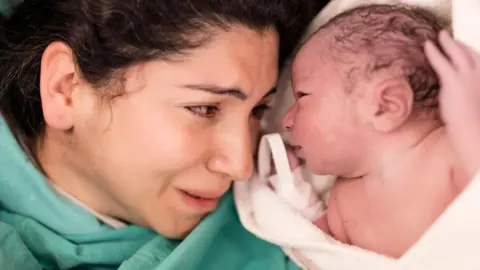One in four babies born by Caesarean in England
Experts link the rise to a growing number of complex pregnancies, where the mother is older or obese.

 Getty Images
Getty ImagesOne out of every four babies is now born by Caesarean section, latest NHS data for England reveals.
The proportion has increased steadily over the past decade.
Experts say it is linked to a “growing number” of more “complex” pregnancies – because the mother is older or obese, for example.
But some mothers are choosing to have a Caesarean – where the baby is delivered by surgeons cutting into the mother’s abdomen and womb – for non-medical reasons.
In 2013-14, 13% of deliveries were Caesareans.
Last year, of the 398,675 deliveries performed by the NHS in England where the method of starting labour was recorded, 101,264 (25%) were Caesareans.
And of those, 67,100 were a planned or “elective” procedure.
‘Rising rates’
Royal College of Obstetricians and Gynaecologists (RCOG) president Dr Ranee Thakar said complex births were a “major factor”.
“We are seeing national rising rates of obesity and people choosing to have children at a later state in their life, both of which can increase the chance of complications,” she said.
The likelihood of a Caesarean increased with the mother’s age.
And for those aged over 39, it was the most common method of delivery.
Most women under 30, meanwhile, had “spontaneous” vaginal births, without medical intervention to start labour.
A third of all deliveries were induced, meaning labour was started using artificial methods such as a hormone drip or a pessary.
The RCOG does not promote one form of birth over another.
‘Major operation’
Experts say women should have a choice about how they give birth, whenever possible and safe.
And the NHS recently removed a limit on how many Caesareans it performs.
Maternity units were previously encouraged to promote natural births and keep the Caesarean rate to about 20%.
But NHS advice now says women have the right to a planned Caesarean if safe.
An NHS spokesman said: “A Caesarean is a major operation that comes with risks, so it’s usually done when it’s the safest option for women and their baby.
“However, some do choose to have a C-section for a non-medical reason.
“NHS maternity teams across the country are fully committed to providing the safest and most personalised care possible to all women, according to best-practice guidance and informed by evidence, to help them to achieve the type of birth they would like.”








